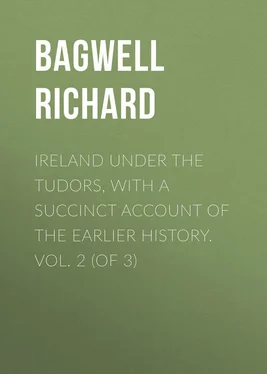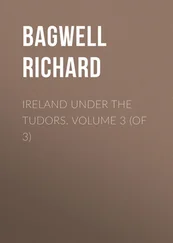Richard Bagwell - Ireland under the Tudors, with a Succinct Account of the Earlier History. Vol. 2 (of 3)
Здесь есть возможность читать онлайн «Richard Bagwell - Ireland under the Tudors, with a Succinct Account of the Earlier History. Vol. 2 (of 3)» — ознакомительный отрывок электронной книги совершенно бесплатно, а после прочтения отрывка купить полную версию. В некоторых случаях можно слушать аудио, скачать через торрент в формате fb2 и присутствует краткое содержание. Жанр: foreign_antique, foreign_prose, Историческая проза, на английском языке. Описание произведения, (предисловие) а так же отзывы посетителей доступны на портале библиотеки ЛибКат.
- Название:Ireland under the Tudors, with a Succinct Account of the Earlier History. Vol. 2 (of 3)
- Автор:
- Жанр:
- Год:неизвестен
- ISBN:нет данных
- Рейтинг книги:4 / 5. Голосов: 1
-
Избранное:Добавить в избранное
- Отзывы:
-
Ваша оценка:
- 80
- 1
- 2
- 3
- 4
- 5
Ireland under the Tudors, with a Succinct Account of the Earlier History. Vol. 2 (of 3): краткое содержание, описание и аннотация
Предлагаем к чтению аннотацию, описание, краткое содержание или предисловие (зависит от того, что написал сам автор книги «Ireland under the Tudors, with a Succinct Account of the Earlier History. Vol. 2 (of 3)»). Если вы не нашли необходимую информацию о книге — напишите в комментариях, мы постараемся отыскать её.
Ireland under the Tudors, with a Succinct Account of the Earlier History. Vol. 2 (of 3) — читать онлайн ознакомительный отрывок
Ниже представлен текст книги, разбитый по страницам. Система сохранения места последней прочитанной страницы, позволяет с удобством читать онлайн бесплатно книгу «Ireland under the Tudors, with a Succinct Account of the Earlier History. Vol. 2 (of 3)», без необходимости каждый раз заново искать на чём Вы остановились. Поставьте закладку, и сможете в любой момент перейти на страницу, на которой закончили чтение.
Интервал:
Закладка:
As to Matthew Kelly, he had tried to turn him out of lands which his father had long ago given him, in which the bastard pretender was ‘maintained and borne up by the chin’ by Sussex. Had he not been wholly occupied in hunting Matthew up and down, he would long since have expelled the Scots, who had been reinforced by Lady Tyrone, and supported by Sussex. The Lord-Lieutenant had given them MacQuillin’s land, ‘which time out of mind hath been mere Englishman,’ having held his estate since the first conquest. The Queen was thus answerable for the strength of the Scots, and without her help he could not undertake to drive them out. Kelly had been killed in a skirmish by chance of war, and he was not to be held answerable for so usual an accident. In fact, he was a blameless subject, who had committed no fault knowingly; ‘but through being wild and savage, not knowing the extremity of her Majesty’s laws, nor yet brought up in any civility whereby he might avoid the same, having also many wild and unruly persons, and hard to be corrected in his country.’ By a stretch of legal ingenuity their misdeeds might possibly be laid at his door, and to avoid that, and ‘not for any mistrust of his own behaviour,’ he asked for protection. Unable to trust Sussex, he had sent over the respectable Dean of Armagh to bring a safe-conduct from the Queen herself, which would enable him to lay his case in person before the English Council, and to return safely. For his expenses he should require 8,000 l. sterling, which, with a fine irony, he declared himself quite willing to repay in Irish currency. For fear of mischances, the Earl of Kildare and other men of rank should be directed to put him safely on board, and to deliver him at Holyhead into Sir Henry Sidney’s charge. After his return Sussex should not be allowed to molest him for three months.
Besides the main grievance about Matthew Kelly, Shane had fault to find with governors in general, and Sussex in particular. When a very young man he had discovered a plot to attack the Pale, and having respect to the common weal of his native country, he had gone boldly to Sir Anthony St. Leger without any safe-conduct. St. Leger had been so much impressed with his virtue that he and all his Council had signed a contract, ‘which I have to be showed,’ to give him 6 s. 8 d. sterling a day. Since that he had suffered much, but not a groat of the pension had ever been paid. Still he bore no malice, and had offered his services to Sussex against the Scots. The Lord-Lieutenant was nevertheless firmly prejudiced in favour of Matthew Kelly, and determined that he, the legitimate chief, should be no officer of his. He accused Sussex of putting innocent men to death, and thus making it impossible for any one to trust him. Sussex always indignantly denied this charge, and he was borne out by Kildare and by the Irish Council.
Shane proudly contrasted the state of his country with that of the Pale, and suggested that the Queen should send over two incorruptible men joined in commission with the mayor and aldermen of Dublin and Drogheda, ‘which are worshipful and faithful subjects,’ to judge which country was the better governed. They might hear the charges against him, and also the complaints of the families of the Pale, ‘what intolerable burdens they endure of cess, taxes, and tallages both of corn, beefs, muttons, porks, and baks.’ Not only did the soldiers live at free quarters, but they had ‘their dogs and their concubines all the whole year along in the poor farmers’ houses, paying in effect nothing for all the same.’ Not less than 300 farmers had gone into Shane’s county out of the Pale. These men were once rich, and had good houses, but they dared not so much as tell their griefs to the Queen, ‘yet the birds of the air will at length declare it unto you.’ Shane considered it ‘a very evil sign that men shall forsake the Pale, and come and dwell among wild savage people.’
Besides his pretensions to the Earldom, or to the captaincy of Tyrone, Matthew Kelly also advanced a claim to the manor of Balgriffin, in the county of Dublin, which had been granted to Con O’Neill, with remainder to his son, Matthew O’Neill, and in default of him and his heirs, with remainder to the right heirs of Con. Shane had taken legal opinions, and was advised that he had a title to Balgriffin, because there was no Matthew O’Neill at the time of the grant. ‘It follows plainly,’ he argued, ‘that I am my father’s right heir, legitimate begotten, and although my said father accepted him as his son, by no law that ever was since the beginning, he could not take him from his own father and mother which were then in plain life.’ Besides which he had inherited the land of ‘his own natural father the smith.’ If the premise that Matthew was Kelly and not an O’Neill be admitted, the reasoning is irrefragable.
Badly as he had been treated, Shane declared himself ready to make restitution wherever anything could be proved against him. His savagery, which he confessed again and again, he thought could best be eradicated by an English wife, ‘some gentlewoman of some noble blood meet for my vocation, whereby I might have a friendship towards your Majesty.’ This impossible she would indeed be much more than an intermediary between him and the Queen to declare his grief and those of his country. ‘By her good civility and bringing up, the country,’ he hoped, ‘would become civil, and my generation so mixed, I and my posterity should ever after know their duties.’ Some educated companion was necessary to him; for the men of the Pale would not even show him how to address his letters properly, and he feared to offend, whereas he desired nothing so much as her Majesty’s approbation and favour. How Shane treated an accomplished woman when he had her in his power will appear hereafter. 19 19 The whole of Shane’s statements are from his letter to the Queen, Feb. 8, 1561. For the refutation of his charge against Sussex, see the Queen to the Nobility and Council of Ireland, May 21, and the Council’s answer, June 12.
To enforce his demands, and to show how disagreeable he could be, Shane burned three villages on the borders of the Pale. Their crime was giving asylum to Henry, son of Phelim Roe O’Neill, who had offended by his loyalty. With much difficulty and many smooth words, the invader was prevented from spreading his ravages further; but he went so far as to threaten the town of Dundalk for sheltering his disobedient namesake, and he demanded an authority equal to that which Desmond had over the western seaports. 20 20 Lord Justice Fitzwilliam to Cecil, Feb. 8, 1561; Jaques Wingfield to Sussex, Feb. 23.
Shane’s proposal to go to Court was accepted in order to gain time. A safe-conduct was sent, and Fitzwilliam was instructed to make his departure easy. Either really suspicious, or anxious to make it appear that he was ill-treated, the troublesome chief then began to make excuses, the most valid being that he had no money. Fitzwilliam wrote him a soothing letter, and Shane then said his retinue could not be ready for nearly two months. He held out stoutly for 3,000 l. at least, but it was feared that he would rebel on receipt of it, ‘conduct,’ said the Lord Justice, ‘which to his kind best belongeth.’ In the meantime he amused himself by plundering the O’Reillys and those on the borders of the Pale. 21 21 Protection for Shane O’Neill, March 4, 1561; Fitzwilliam to the Queen, April 5, 8, and 26.
Интервал:
Закладка:
Похожие книги на «Ireland under the Tudors, with a Succinct Account of the Earlier History. Vol. 2 (of 3)»
Представляем Вашему вниманию похожие книги на «Ireland under the Tudors, with a Succinct Account of the Earlier History. Vol. 2 (of 3)» списком для выбора. Мы отобрали схожую по названию и смыслу литературу в надежде предоставить читателям больше вариантов отыскать новые, интересные, ещё непрочитанные произведения.
Обсуждение, отзывы о книге «Ireland under the Tudors, with a Succinct Account of the Earlier History. Vol. 2 (of 3)» и просто собственные мнения читателей. Оставьте ваши комментарии, напишите, что Вы думаете о произведении, его смысле или главных героях. Укажите что конкретно понравилось, а что нет, и почему Вы так считаете.












